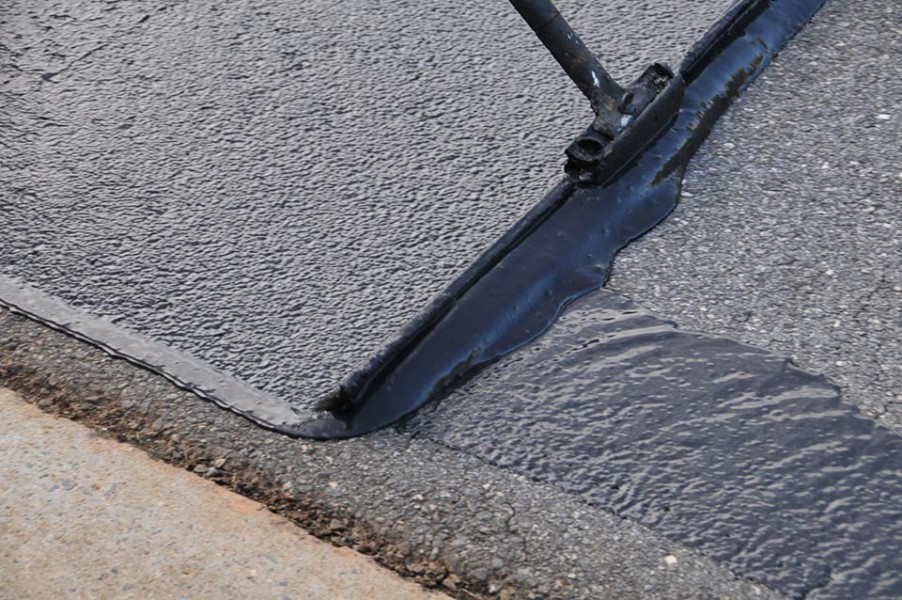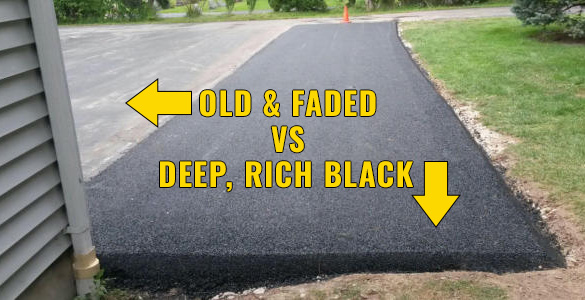Safeguard Surfaces with Expert Asphalt Sealing: Cold Mix Essentials
Wiki Article
Cold Mix Asphalt Vs. Hot Mix Asphalt: Which Is Right for You?

Make-up Differences
Cold mix and warm mix asphalts vary considerably in their structure, with distinct qualities that affect their efficiency and applications. Cold mix asphalt is produced by emulsifying the asphalt binder with water and an emulsifying agent prior to blending it with accumulation. This method enables the asphalt to be convenient at lower temperature levels, making it excellent for short-term repair work and for usage in cooler climate condition. Hot mix asphalt, on the various other hand, is made at heats, usually between 300-350 ° F, which assists to accomplish far better compaction and an extra durable end product. The hot mix asphalt production process includes heating up the accumulation and asphalt binder independently prior to incorporating them at the asphalt plant.
Furthermore, cold mix asphalt tends to be less dense and more adaptable than warm mix asphalt. This adaptability makes it far better matched for areas with higher levels of activity, such as driveways or roadways with hefty web traffic. In contrast, hot mix asphalt is known for its high resilience and resistance to rutting and breaking, making it a preferred choice for freeways and high-traffic roadways where durability is important.
Setup Process Differences
The process of setting up cool mix and warm mix asphalt exhibits significant differences in their requirements and treatments. In contrast, hot mix asphalt requires an extra elaborate installation procedure. Due to the home heating requirements, hot mix asphalt setups are typically brought out by specialists with customized equipment, guaranteeing a much more structurally sound and permanent result.Toughness and Long Life Factors
When taking into consideration asphalt alternatives, toughness and durability are essential factors to review for lasting sidewalk performance. Warm mix asphalt (HMA) is known for its extraordinary durability and longevity.
In regards to durability, HMA generally outperforms CMA as a result of its exceptional strength and resistance residential or commercial properties. HMA sidewalks have a longer life span, requiring much less frequent fixings and maintenance, which can convert to cost financial savings over time. Additionally, HMA pavements are more quickly customizable to satisfy specific task requirements, better improving their durability.
Expense Factors To Consider
Thinking about the economic implications is a critical aspect when examining the choice between warm mix asphalt (HMA) and cool mix asphalt (CMA) for pavement jobs. While the first cost of hot mix asphalt is commonly higher than that of chilly mix asphalt, HMA commonly provides a much more economical solution in the future because of its premium resilience and durability. HMA is recognized for its capacity to withstand rush hour tons and rough weather, decreasing the requirement for regular fixings and upkeep. On the various other hand, cool mix asphalt is more budget friendly upfront however may require more regular patching and resurfacing, resulting in greater maintenance expenses with time.In addition to material prices, it's vital to take into consideration the expenditures connected with installation and upkeep when contrasting HMA and CMA. HMA typically requires customized tools and competent labor for proper installation, which can influence general project prices. On the other hand, CMA is simpler to work with and can often be used using less complex methods, potentially decreasing setup expenditures. Eventually, the decision in between HMA and CMA should think about not just the first expense but additionally the long-lasting economic ramifications to determine one of the most cost-effective alternative for the particular sidewalk task.
Environmental Effect Contrast
Comparison of the environmental effects in between hot mix asphalt (HMA) and chilly mix asphalt (CMA) discloses distinctive differences in sustainability methods. HMA production calls for high temperatures, leading to enhanced energy consumption and greenhouse gas emissions.In addition, the use of CMA frequently involves reusing existing asphalt pavement, advertising resource preservation and minimizing the amount of waste sent out to landfills. By deciding for CMA over HMA, road construction jobs can try this website contribute favorably to environmental preservation efforts.
Verdict
To conclude, the selection between chilly mix asphalt (CMA) and warm mix asphalt (HMA) depends on different aspects such as structure, installation procedure, sturdiness, durability, expense, and ecological influence. angle parking. While CMA uses a quick and cost-effective solution for minor repair services, HMA makes certain superior resilience and long life for hefty traffic areas. Think about these variables carefully to identify which sort of asphalt is the ideal selection for your paving requires

Thinking about the economic ramifications is a crucial element when reviewing the choice in between warm mix asphalt (HMA) and cold important site mix asphalt (CMA) for sidewalk tasks. While the initial expense of warm mix asphalt is typically higher than that of cool mix asphalt, HMA often supplies an extra cost-effective service in the lengthy run due to its premium resilience and durability. asphalt repair.Comparison of the environmental effects between warm mix asphalt (HMA) Read Full Article and cool mix asphalt (CMA) discloses distinct differences in sustainability methods.In verdict, the choice between cold mix asphalt (CMA) and hot mix asphalt (HMA) depends on different aspects such as make-up, installment procedure, toughness, long life, expense, and environmental impact
Report this wiki page